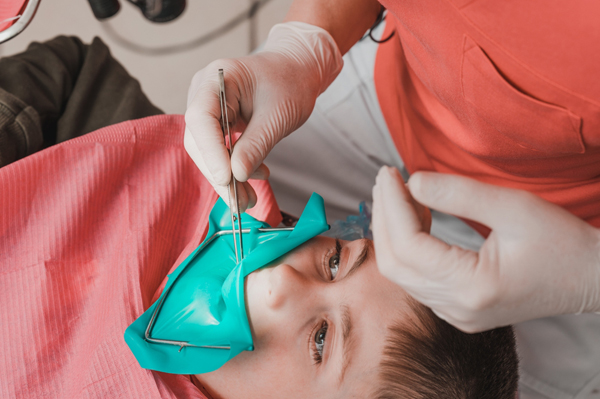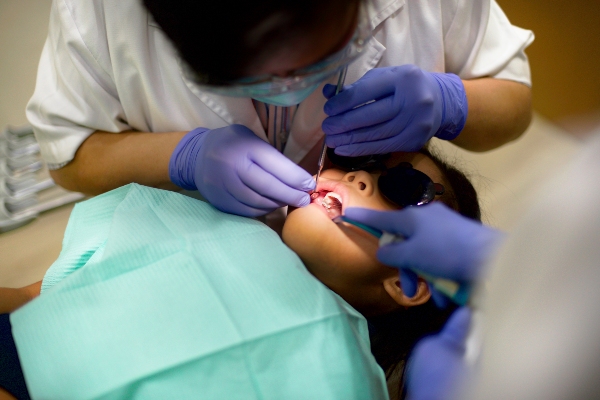Root Canal Procedure for Baby Teeth

A root canal for baby teeth is not something that is performed too often. Oftentimes, baby teeth do not require in-depth work because they will be replaced later by permanent, adult teeth. However, in some situations, baby teeth may require a root canal, in which case there are a few things to be aware of ahead of time.
The term root canal often strikes fear in individuals because it has a reputation for being a challenging and uncomfortable procedure. However, what is important to know is that a root canal is only required when absolutely necessary. It is a procedure that can restore a tooth that is in bad shape. Oftentimes, it even eliminates one's pain, which is a common symptom of an infected tooth. In the case of a root canal for baby teeth, parents may be alarmed or concerned. Thankfully, pediatric dentists have access to the most up-to-date technology and have undergone extensive training to ensure that the procedure is performed with extra care.
A quick guide to a root canal for baby teeth
Below is an overview of what is involved in a root canal for baby teeth. This information may be quite helpful to parents who are wondering what their child should expect.
Root canal for baby teeth defined
A root canal for baby teeth is very similar to a traditional root canal; however, instead of the permanent adult teeth being worked on, the pediatric dentist attempts to save a primary or baby tooth.
The goal is to remove all of the infected parts of the tooth, which are usually located in the pulp where the nerves live. Once removed, the tooth can be restored using a dental crown.
The process
To start a root canal for baby teeth, a pediatric dentist will thoroughly numb the child's oral cavity to ensure that no pain is felt. Numbing typically involves the use of a topical gel and a shot of medication. This part may take a few minutes. However, once the child is completely numb, the procedure can begin.
Next, a small dental instrument will be used to carefully expose the roots of the baby tooth. Once exposed, the dentist will either remove them completely or clean the cavity of the tooth out to get rid of any infected areas. After the cavity of the tooth is cleared out, the cavity will be cleaned and rinsed. This part is crucial as it ensures that nothing harmful gets left behind. After that, a dental material will be used to fill the area so that further damage cannot be done.
To finish a root canal for a baby tooth, the dentist will cap the entire tooth with a temporary dental crown. The temporary crown is a placeholder for a permanent one, which will be placed a couple of weeks after the initial procedure. Most commonly, for baby teeth, dental crowns are made of composite resin. This is a material that dentists use frequently because it is durable, but not too costly since the tooth will later be replaced by an adult one.
What else to know
It is often asked why baby teeth would even need a root canal to begin with, since they fall out later on. In some cases, this may prove to be correct; however, for the most part, the pediatric dentist will only opt for a root canal if the adult tooth is not ready to erupt yet. Baby teeth are meant to be placeholders until the adult teeth come through, and if there are not any teeth present until that happens, the surrounding teeth may shift, and the gums may suffer. This can also lead to other problems with eating and speech. If there are not enough teeth in the oral cavity at a young age, one's day-to-day life can be affected, which could result in the need for additional treatments.
Find out more from a pediatric dentist
A root canal for baby teeth is performed by a pediatric dentist as they have the knowledge and training to ensure a successful outcome. Parents that have further questions or concerns about the process and what to expect should consult directly with the dentist. Anything unknown can be appropriately addressed. Additionally, the dentist can evaluate the baby tooth to determine what type of action is necessary. Reach out today to learn more or to get scheduled for an appointment.
Request an appointment here: https://www.hvkidsmiles.com or call Hudson Valley Pediatric Dentistry at (845) 363-4177 for an appointment in our Middletown office.
Check out what others are saying about our services on Yelp: Read our Yelp reviews.
Recent Posts
Dental fillings for kids are recommended for those with small cavities in their primary or secondary teeth. In order to understand their importance, parents must first understand the role of the teeth and the ramifications of cavities. This guide aims to help you understand why we recommend fillings for your kids and what to expect…
Dental fillings for kids can be nerve-wracking for some kids, likely due to the necessary tools. While we aim to make this simple process as smooth and painless as possible, we need your help. Getting a firm grasp on what your kids can expect during this procedure and how to prevent a future need for…
Dental fillings for kids restore the smile for years to come. Proper aftercare and consistent oral hygiene help to ensure your child gets the most out of their fillings. Thankfully, caring for these restorations is simple and straightforward, particularly with the help of a pediatric dentist.A dental filling is a dental restoration that “fills” cavities…
Dental fillings are a key part of protecting children’s oral health. When prevention efforts fail, this simple procedure stops cavities from doing further damage to dental health. Here, we take a closer look at the benefits of treating childhood tooth decay with dental fillings for kids.According to the Centers for Disease Control and Prevention (CDC),…


